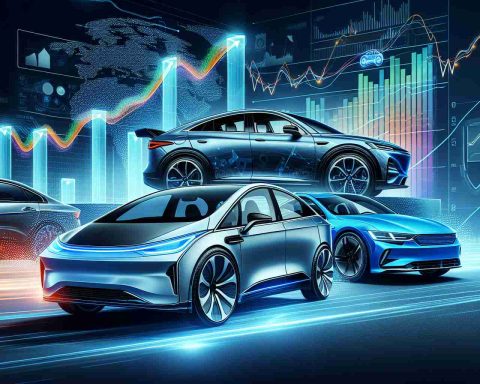- The Indonesia International Motor Show in Jakarta highlighted the nation’s shift from conventional gasoline engines to electric vehicles (EVs).
- Governmental initiatives are rapidly accelerating the adoption of EVs, aiming for a greener and more sustainable automotive industry.
- Electric vehicles dominated the exhibition, showcasing advanced features such as autonomous capabilities and smartphone integration.
- The show underscored a significant environmental commitment from both policymakers and manufacturers.
- Indonesia is positioning itself as a leader in the transition to sustainable transportation, promoting a shared vision of ecological responsibility.
A dazzling display of innovation unfolded in Jakarta as the Indonesia International Motor Show kicked into gear, drawing enthusiasts and industry leaders from far and wide. Against the backdrop of Indonesia’s vibrant capital, the expansive exhibition showcased the nation’s rapidly evolving automotive landscape, where the hum of gasoline engines begins to give way to the futuristic whirr of electric vehicles.
For years, Japanese automakers have dominated Indonesia’s roads, their vehicles weaving into the tapestry of everyday life. Yet, a powerful shift thrives beneath the surface. Encouraged by governmental initiatives championing electric vehicle adoption, the industry is accelerating toward a greener horizon. Rows of sleek, silent machines captivate visitors’ imaginations, pointing to a cleaner, more sustainable future.
Electric vehicles take center stage, their bold designs and innovative technologies shining under the exhibition lights. Exhibitors unveil models promising not only reduced emissions but also cutting-edge features, from advanced autonomous capabilities to smartphone integration. The government’s clear message of environmental responsibility resonates through every booth, heralding a transportation revolution that embraces both progress and preservation.
As attendees navigate the spirited affair, the gripping narrative of transformation is inescapable. This dynamic push for electric vehicles represents more than a change in transportation; it’s a commitment to a greater ecological vision shared by policymakers and manufacturers alike. With each turn of a wheel, Jakarta’s motor show serves as a beacon of change, inviting all to participate in driving the world toward a more sustainable tomorrow. The road ahead is charged with promise, as Indonesia stands at the forefront of this electrifying journey.
Discover the Electrifying Future of Indonesia’s Automotive Industry
Market Overview
The Indonesia International Motor Show is more than just an exhibition of new vehicles; it is a window into the future of automotive technology in Southeast Asia. Indonesia’s automotive market has been historically dominated by conventional gasoline vehicles, especially from Japanese manufacturers. However, a significant transformation is underway as the nation embraces electric vehicles (EVs) as part of its broader strategy for sustainable development.
Government Initiatives and Their Impact
Indonesia’s government has introduced several initiatives to accelerate the adoption of electric vehicles. This includes tax incentives, investment in charging infrastructure, and subsidies for electric vehicle manufacturers and buyers. The goal is to achieve a significant reduction in carbon emissions and decrease reliance on fossil fuels. Such strong governmental support is crucial in fostering a favorable environment for the EV market.
Innovations on Display
At the motor show, manufacturers are not only displaying electric cars but are also showcasing innovations that focus on autonomous driving technologies and seamless smartphone integration. These features are being developed to meet the growing consumer demand for technology-driven solutions that enhance driving experience and safety.
Challenges and Limitations
While the push for EVs in Indonesia is promising, there are challenges to overcome. The country needs to develop an extensive charging network to support widespread EV adoption. Moreover, issues such as the high cost of EV batteries and the need for skilled labor in the EV sector present barriers. Educating consumers about the benefits and functionality of EVs is also crucial in overcoming skepticism and promoting adoption.
Market Forecast and Trends
The growth trajectory of the Indonesian EV market is expected to be significant over the next decade. Increased investment from both local and international automotive manufacturers will likely propel the industry forward, making Indonesia a regional hub for electric vehicle production and innovation. As these vehicles become more affordable and the necessary infrastructure is put in place, consumer adoption is expected to rise sharply.
Important Questions and Answers
1. What are the key factors driving the shift towards electric vehicles in Indonesia?
Government incentives, growing environmental consciousness, and increased technological advancements in vehicle efficiency and design are the primary drivers.
2. How does the current infrastructure support the growth of EVs in Indonesia?
While infrastructure is currently limited, ongoing government and private sector investments are rapidly expanding the country’s charging station networks.
3. What innovations should consumers look for in upcoming EV models?
Upcoming models will likely prioritize advanced autonomous driving features, enhanced battery life, faster charging capabilities, and smart connectivity solutions.
Suggested Links
– Hyundai
– Honda
– Toyota
– Tesla
The Indonesian automotive industry is on the cusp of a transformative journey, with electric vehicles at the forefront. Through collaborative efforts from both the government and industry stakeholders, the nation aims to redefine its transportation landscape, aligning with global sustainability goals. As this journey unfolds, Indonesia has the potential to become a leader in the Southeast Asian electric vehicle market.


















